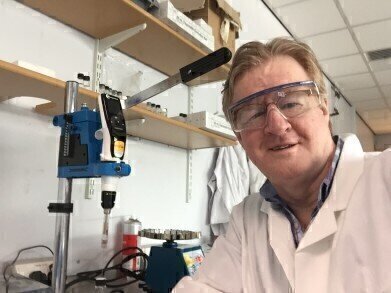-
 David Needham
David Needham
News & Views
Metabolic Inhibitor holds Promise as Preventative for Covid-19
Feb 28 2022
Work to develop a new formulation of a common metabolic inhibitor (niclosamide) by David Needham, Professor of Translational Therapeutics in the School of Pharmacy at the University of Nottingham and Professor of Mechanical Engineering and Materials Science at Duke University, could result in a promising early treatment for Covid-19.
Following studies conducted over the past year that point to the effectiveness of niclosamide’s capability to effectively halt the replication of the SARS-COV2 virus, Professor Needham has shown that a simple slight increase in solution pH might be all it takes to turn a drug, that he has already repurposed in new research for cancer, into a promising prophylactic/preventative nasal spray and early treatment throat spray for COVID-19; this formulation is now ready for testing.
Originally used as an anti-parasitic oral application, niclosamide killed tapeworms on contact in the gut by inhibiting their crucial metabolic pathway and shutting down their energy supply. This same ability to lower the energy supply in a cell, has shown that it can also reduce the energy a virus needs to replicate. However, niclosamide’s poor solubility in water makes it very difficult to use elsewhere.
Recent unpublished studies by Needham’s collaborators (in the labs of Christina Barkauskas, MD and Patty Lee MD) at Duke (Durham, North Carolina) used human airway cells and suggested that increasing the normally low water solution concentration by 10 times might be enough for the drug to work on respiratory viruses in patients.
The new formulation research demonstrates that simply raising the pH of a solution to a slightly alkaline pH 8.0, which is an acceptable range for a nasal spray, can dissolve enough niclosamide to be effective in the preliminary lab studies with human airway cells. And raising the pH to 9.2, which is still tolerable for a throat spray, beats that benchmark by 10 times over and so could be used in early infection.
Professor Needham explains: “For cells that could be infected or already are infected, niclosamide acts by turning down the dimmer switch on those host cells so that the virus cannot use the cell’s own machinery to replicate. Used as a nasal spray it could be added protection behind the mask and therefore has the potential to reduce or eliminate the viral load in the nasal cavity where initial infection and replication takes place. It essentially puts the virus in lockdown”
“Because it works on the host cells rather than the virus, niclosamide could function as a respiratory viral preventative/prophylactic agent, not just against COVID-19 and all of its variants, but against any new virus as well. While vaccines are clearly effective, a nasal preventative would be added protection. And even if an infection has already taken hold, this formulation could be used as an early treatment throat spray that could stop the viral load heading toward the lungs that causes the disease’s most devastating effects. It just needs testing, he added.”
David is actively seeking industry and preferably government and infectious disease institute partners to help pursue clinical trials, manufacturing and distribution across the world.
The research was published in the journal Pharmaceutical Research.
More information online
Digital Edition
Lab Asia 31.2 April 2024
April 2024
In This Edition Chromatography Articles - Approaches to troubleshooting an SPE method for the analysis of oligonucleotides (pt i) - High-precision liquid flow processes demand full fluidic c...
View all digital editions
Events
Apr 22 2024 Marrakech, Morroco
Making Pharmaceuticals Exhibition & Conference
Apr 23 2024 Coventry, UK
Apr 23 2024 Kintex, South Korea
Apr 23 2024 Seoul, South Korea
Apr 24 2024 Jakarta, Indonesia







.jpg)









